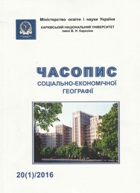The integration paradigm of geography
Abstract
The processes of natural and humanitarian integration in the geography are described. The humanistic geography (or human geography, anthropogeography), is seen as an integrating methodology for geography which combines the principles of natural sciences and humanities. The general scientific problems connected with the dehumanization of knowledge as well as with differentiation of sciences are rethinking. The history of geographical paradigms development is explored. Anthropogeographical paradigm (anthropogeography), which combines the principles of natural sciences and humanities, prevailed in Russian geography of the early XX century and then turned out to be uncalled by Marxist-Leninist philosophy. Positivist paradigm, connected with dehumanization of knowledge as well as with differentiation of sciences, held dominating position in Soviet geographical school. The role of postmodern worldview in the development of post-disciplinary knowledge is revealed. The introduction subject in the scientific knowledge is defined.
The role of geography in development of humanistic scientific values and post-disciplinary knowledge is based. The development of the humanism in geographic sciences is analyzed in the historical aspect. The current problems of “mechanistic approach” in geography are investigated. The necessity of perfection of current system paradigm with entering of humanistic elements is substantiated. It is offered four ways for paradigm transformation: 1) from anthropocentrism to humaneness; 2) from systematicity to humanistic synergy; 3) from quantitative methods to its further qualitative analysis and humanistic interpretation; 4) from territorial differentiation to philosophic fundamentals of global geo-space.
Downloads
References
2. Bredikhin, A.V. (2010). Rekreatsionno-geomorfologicheskie sistemy. M. – Smolensk, 330.
3. Bunin, I.A. (1915). Vesti s rodiny. Sobr. soch. v 6 t. M.: Izdanie t-va A.F. Marks, Petrograd, 2, 29-36.
4. Voblyi, K.H. (1947). Organіzatsіya pratsі naukovoho pratsіvnyka (metodyka і tekhnіka). K.: Vydavnytstvo AN URSR, 150.
5. Gadamer, Gans-Georg. (2000). Іstina і metod: per. z nіm. K.: Iunіvers. T. 1.: Germenevtika І: Osnovy fіlosof. germenevtiki, 464.
6. Gettner, A. (1930). Geografiya, ee istoriya, sushchnost i metody. L.: Gosizdat «Krasnyi proletariy», 416.
7. Golubchikov, Iu.N. (1981). Energetiko-fizicheskiy podkhod k izucheniyu prirodnykh kompleksov. Voprosy geografii. Geofizika landshafta. M.: Mysl, Sb. 117, 88-95.
8. Grigoriev, A.A. (2012). Geografiya vsemirnogo naslediya. Spb.: Asterion, 344.
9. Dronin, N.M. (1999). Evolyutsiya landshaftnoy kontseptsii v russkoy i sovetskoy fizicheskoy geografii. M.: GEOS, 232.
10. Zamiatin, D.N. (2003). Gumanitarnaya geografiya. Prostranstvo i yazyk geograficheskikh obrazov. M.: Aleteia.
11. Zamiatin, D.N. (2004). Metageografiya. Prostranstvo obrazov i obrazy prostranstva. M.: Agraf, 512.
12. Іshchuk, S.І., Shparaga, T.І., Gladkey, O.V. (2003). Rozkolota geografіya. Naukovі zapysky Vіnnytskoho derzhavnoho pedagogіchnoho unіversytetu іmenі Mykhayla Kotsyubynskoho. Serіya: Geografіya, 6, 5-8.
13. Kalutskov, V.N. (2008). Landshaft v kulturnoy geografii. M.:«Novyi khronograf», 320.
14. Kalutskov, V.N. (2000). Osnovy etnokulturnogo landshaftovedeniya: Uch. pos. M.: Izd-vo MGU, 96.
15. Kolbovskiy, E.Iu. (2011). Esteticheskaya otsenka landshaftov: problemy metodologii. Yaroslavskiy pedagogicheskiy vestnik, 4, III (Estestvennye nauki), 161-166.
16. Maksakovskiy, V.P. (1998). Geograficheskaya kultura. M.: Gumanit. izd. tsentr Vlados, 416.
17. Mironenko, N.S. (2001). Stranovedenie: Teoriya i metody. Uch. pos. dlya vuzov. M.:«Aspekt Press», 268.
18. Moroz, S.A., Onoprіenko, V.І., Bortnik, S.Iu. (1997). Metodologіya geografіchnoi nauky: Navch. posіbnyk. K.: Zapovіt, 333.
19. Nikolaev, V.A. (2003). Landshaftovedenie. Estetika i dizayn. M.: Aspekt press, 176.
20. Ozerov, A.G. (2009). Formirovanie ekologicheskoy kultury lichnosti v protsesse issledovatelskoy, turistsko-kraevedcheskoy deyatelnosti uchashchikhsya. Kraevedcheskiy almanakh, 1, 3-12.
21. Petrova, E.G., Mironov, Yu.V. (2014). Emotsionalno-zritelnoe vospriyatie prirodnykh landshaftov v Rossii i Yaponii: sravnitelnyi analiz. Izvestiya RAN. Seriya geograficheskaya, 1, 130-140.
22. Pіstun, M.D. (1996). Osnovy teorіi suspіlnoi geografіi: Navch. posіbnyk. K.: Vyshcha shkola, 231.
23. Preobrazhenskiy, V.S., Aleksandrova, T.D., Maksimova, L.V. (1997). Geografiya v menyayushchemsya mire. Vek XX. M.:«IGRAN», 273.
24. Preobrazhenskiy, V.S. (1998). Ostrye problemy landshaftovedeniya na rubezhe vekov. Izvestiia RAN. Ser. geograf., 3, 14-19.
25. Preobrazhenskiy, V.S. (2001). Ya – geograf. Iz tvorcheskogo naslediya. M.: GEOS, 292.
26. Ragulina, M.V. (2004). Kulturnaya geografiya: teorii, metody, regionalnyi sintez. Irkutsk: IG SO RAN, 173.
27. Ragulina, M.V. (2007). Kulturnyi landshaft i sotvorchestvo cheloveka i prirody. Geografiya i prirodnye resursy, 3, 88-95.
28. Saushkin, Yu.G. (2001). Izbrannye trudy. Smolensk: Universum, 416.
29. Simonov, Yu.G. (2008). Istoriya geografii v Moskovskom universitete: sobytiya i lyudi. M.: «Gorodets», 504.
30. Solntsev, V.N. (1977). O trudnostyakh vnedreniya sistemnogo podkhoda v fizicheskuyu geografiyu. Voprosy geografii. M.: Mysl, 104.
31. Tishkov, A.A. (2012). Lyudi nashego plemeni. Ocherki. M.: Institut geografii RAN, 276.
32. Tiutiunik, Yu.G. (2013). Problemnye voprosy teorii kulturnogo landshafta. Izvestiya RAN. Seriya geograficheskaya, 4, 34-45.
33. Turner, B.L. (2002). Contested identities: Human-environment geography and disciplinary implications in a restructuring academy. Annals of the Association of American Geographers, 92(1), 52-74.




